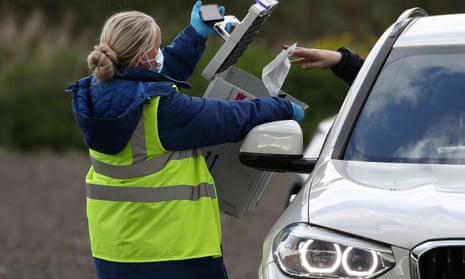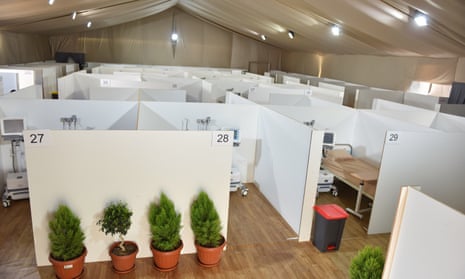This blog is closing now but thanks very much for reading. We’ll be back in a few hours with more rolling coverage of the pandemic from all around the world.
In the meantime you can catch up with all our coverage of the pandemic here.
This blog is now closed. You can find all of our coverage of the pandemic here.

This blog is closing now but thanks very much for reading. We’ll be back in a few hours with more rolling coverage of the pandemic from all around the world.
In the meantime you can catch up with all our coverage of the pandemic here.
New South Wales premier Gladys Berejiklian is expected to shortly announce a four-week extension to the Greater Sydney lockdown.
The Guardian understands Berejiklian will not be introducing curfews, but the government is exploring rapid antigen testing for year 12 students to allow them to return to school ahead of their HSC exams. Other years will be expected to remain at home for their schooling over the additional four-week period.
These rapid tests may also be used at essential workplaces such as supermarkets.
A singles bubble, which would allow those who live alone to visit one other person in the same circumstances, is also likely to be introduced for this next phase of the lockdown.
Flexible working should become the “new normal” after the experience during the coronavirus pandemic, Labour said.
With millions moving to home working almost overnight in March 2020 in response to the first national coronavirus lockdown, the opposition party in England is calling for the right to flexible working to be made mandatory in all jobs to ensure that “work fits around people’s lives instead of dictating their lives”.
Deputy Labour leader Angela Rayner said the concept would not just be about allowing people to work from home, as they have done to reduce Covid-19 transmissions over the past 16 months, but should also include flexible, compressed, staggered or annualised hours.
Kuwait’s civil aviation authority said all arrivals must have a negative Covid-19 PCR test before they board their flights and must not be showing any symptoms.
All arrivals will have to be home quarantined for seven days unless they take a Covid-19 PCR test inside Kuwait that comes out negative, Reuters reports. The Kuwaiti government on Monday eased some coronavirus related restrictions and resumed all activities except for gatherings which include conferences, weddings and social events.
US president Joe Biden will announce on Thursday a requirement that all federal employees and contractors be vaccinated against Covid-19 or be required to submit to regular testing, CNN reported.
The latest Covid situation in Australia:
Americans fully vaccinated against Covid-19 should go back to wearing masks in indoor public places in regions where the coronavirus and especially the Delta variant are spreading rapidly, US authorities said.
The US Centers for Disease Control and Prevention (CDC) also recommended all students and teachers at kindergarten up to 12th grade schools wear masks regardless of vaccination status. The CDC said children should return to full-time, in-person learning in the autumn with proper prevention strategies.
The changes mark a reversal of the CDC’s announcement in May that prompted millions of vaccinated Americans to shed their face coverings, Reuters reports.
Theatre lovers in Northern Ireland have been treated to a live performance for the first time since the start of the pandemic.
Only 90 minutes after regulations formally changed to permit theatres to reopen, the lights went down at the Lyric Theatre for the opening night of Dracula in Belfast.
It was the first audience the venue had hosted for 16 months.
Rules meant the 390-capacity theatre was only a third full and all audience members had to comply with a range of Covid mitigation measures, including the wearing of face masks, PA reports.
The US had administered 342,607,540 doses of Covid-19 vaccines in the country and distributed 395,460,845 doses as of Tuesday morning, the US Centers for Disease Control and Prevention said.
The figures are up from the 342,212,051 vaccine doses the CDC said had gone into arms by 26 July, out of 394,949,575 doses delivered.
It said 188,996,475 people had received at least one dose, while 163,312,474 people were fully vaccinated as of Tuesday, Reuters reports.

Kuwait said it will only allow vaccinated citizens to travel abroad starting August 1, the government communication office reported.
The statement excepted children under age 16, those with a health ministry certificate saying they cannot be vaccinated, and pregnant women who get a pregnancy proof certificate from authorities, Reuters reports.

Plans to significantly open up international travel are expected to be announced on Wednesday, with UK ministers poised to let people who have been fully vaccinated in the US and EU avoid quarantine if arriving from amber list countries.
The move would benefit millions of people by finally letting them be reunited with family and friends based in the UK, as well as businesses in the aviation and tourism sectors that have been hit hard by the pandemic.
Currently, only those who have been inoculated by the NHS are eligible for a “Covid pass” to show upon return that would allow them to skip the self-isolation period of up to 10 days if coming from an amber list country, under the rules of the traffic light system that grades countries according to their case, variant and vaccination rates.
Corporate landlords in the US continue to evict tenants - many of them people from ethnic minorities during the Covid-19 pandemic, despite a federal ban on evictions, a congressional panel was told.
The hearings followed last week’s announcement by the U.S. House Select Subcommittee on the Coronavirus Crisis of an investigation into the practice, Reuters reports.
“Let me be clear, the aggressive actions of these large corporate landlords are unacceptable, and they must stop immediately,” said Representative James Clyburn, the panel’s chairman.
British prime minister Boris Johnson is expected to approve the reopening of England’s doors to double-vaccinated tourists from the EU and the US, Financial Times reported.
UK ministers pushed the prime minister to act, arguing that it was safe to start re-admitting foreign tourists without the need for quarantine if they had received two vaccine doses, the newspaper said.
Major aged care providers in the UK have warned vaccination rates for their home care staff remain extraordinarily low, just days after the government conceded it still has no specific plan for vaccinating the workforce.
About 150,000 aged care workers provide care to about 1 million older Australians in their own homes across the country, but the government revealed on Friday it still has no dedicated plan for vaccinating home care staff and has given the issue little focus.
It has not extended the vaccine mandate for residential workers to home care workers, despite warnings weeks ago that it was an “obvious blind spot” in the rollout.